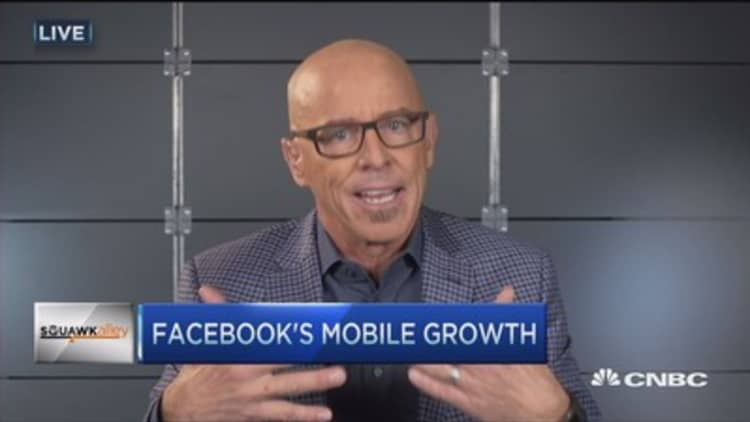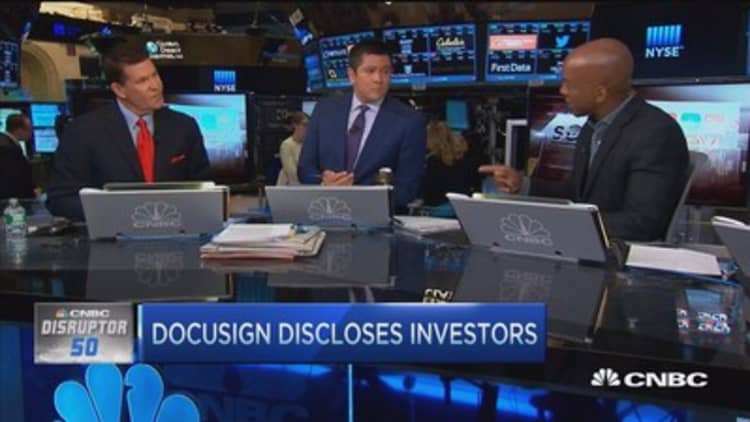Here's the thing about start-up prices: They go up ... and down.
Dropbox and Snapchat have made headlines of late because money managers have marked down their positions, calling into question the lofty valuations. Others experiencing some price sobriety include Jawbone, DocuSign, Datastax, Turn and Bloom Energy.
Stock market volatility, macroeconomic concerns in China and a continued lack of IPOs are forcing adjustments by portfolio managers, who have to value illiquid investments based on imperfect information.
But as with any asset class, value moves in both directions. Fund managers are still marking up plenty of their richly valued start-ups, including Uber, Airbnb, Palantir, Lyft, Spotify, SpaceX, CloudFlare and India's Flipkart, according to recent filings.
"Having movements is healthy and having corrections is healthy and should not be seen as the world is ending," said Sven Weber, president of the SharesPost 100 Fund, a collection of venture-backed companies that's been available to the investing public since early last year. "Upward movements still outnumber downward movements, and generally that's what you want to see."
We've seen high-profile fluctuations before. There was even a time — remember — when Facebook was getting marked down because its business supposedly couldn't support a $15 billion valuation. It's now worth more than $300 billion.
That's not to suggest Snapchat and Dropbox don't face significant challenges. Snapchat, which was valued at $16 billion this year, is searching for a working advertising model, while Dropbox, valued last year at $10 billion, is struggling to move from a consumer file-sharing business to an enterprise software company.

Given those hurdles, it's no surprise that BlackRock marked down its Dropbox position by about 23 percent in June and Fidelity recently slashed a quarter off the value of its Snapchat holdings.
In the absence of a public price or a recent fundraising round, funds have to use factors like stock market comparables, related mergers and acquisitions and general execution risks to determine valuations. They also apply an illiquidity discount that varies, depending on how long a company is expected to stay private.
Funds refer to these factors as "unobservable inputs."
The ClearBridge Small Cap Growth Fund, a $3.2 billion fund that invests in growth companies, marked DataStax down by 29 percent in September from the beginning of the year. DataStax, which is commercializing the open source database technology Cassandra, raised capital last year at an $830 million valuation.
ClearBridge also lowered its price on DocuSign, the e-signature company that's been valued at $3 billion. ClearBridge bought $12 million worth of shares in April, and by Sept. 30 had reduced the value by 21 percent to $9.61 million.

One other that ClearBridge marked down is ad-tech company Turn, which was reportedly valued at about $700 million in early 2014. Clearbridge, which bought shares in December 2013, valued its stake at $5.86 million in January and cut it by 26 percent in September to $4.32 million.
GSV Capital, a publicly traded fund consisting mostly of shares in venture-backed companies, marked down its Jawbone stake by more than half this year. The connected device maker was valued at $3 billion in September 2014, but has struggled to keep pace with Fitbit and is being further pummeled by the Apple Watch and Android Wear.
GSV marked down Dropbox by 17 percent since June, and Gilt Groupe by almost two-thirds this year.
Read MoreGGV: Internet financing will continue
On the flip side, GSV reported a 20 percent increase in the value of its Palantir stake this year, a 44 percent jump in its Spotify shares and an 86 percent surge in the value of its Lyft holdings.
In its third-quarter earnings call last week, GSV CEO Michael Moe highlighted Lyft's partnerships with China's Didi Kuaidi, Starbucks, Hertz and Shell as growth catalysts.
"These are great wins for Lyft, and we are optimistic about the company's continued hypergrowth and expanding market share," Moe said.
Lyft's larger rival Uber was marked up by a Fidelity fund by 19 percent between May and August, and the same fund boosted its SpaceX value by 15 percent. Another Fidelity fund reported that the value of its Airbnb stake more than doubled between February and August.
In each case, prices are based on a snapshot of business conditions at a moment in time. While some high-priced start-ups face existential threats that are forcing dramatic price reductions, most of the adjustments simply reflect the reality of playing in high-risk, illiquid markets.
"Some names go down for a quarter or two and then jump back," said Weber.
It just so happens that the names getting hammered now are among the most prominent.










